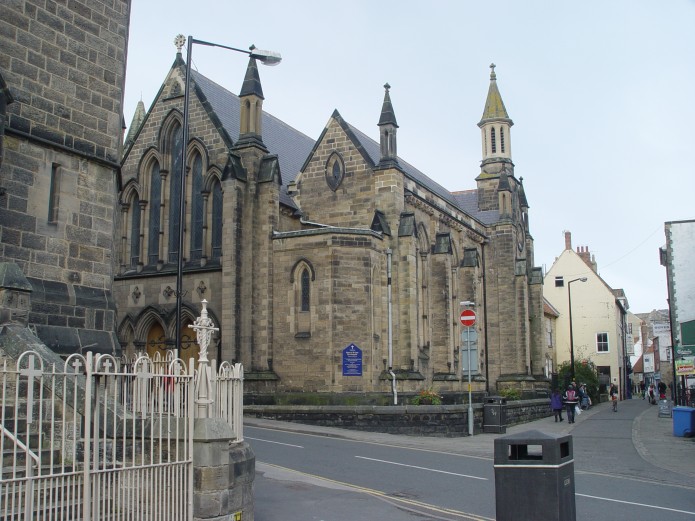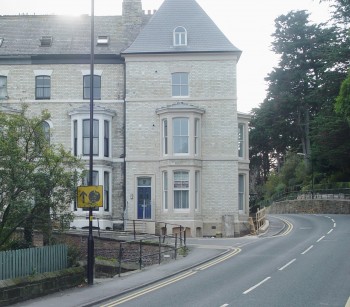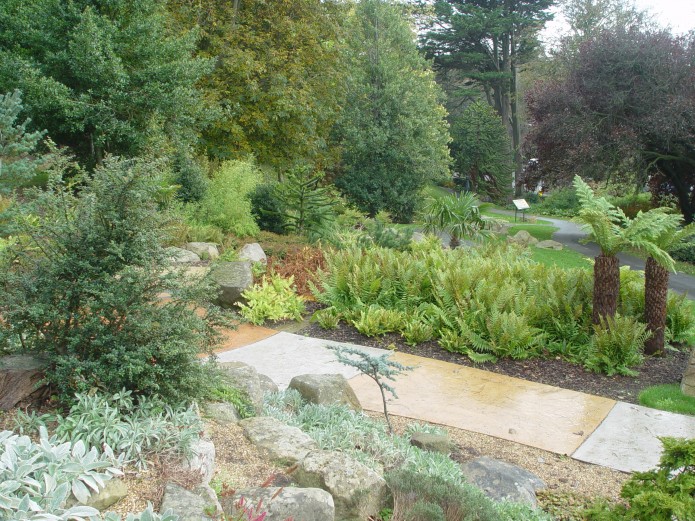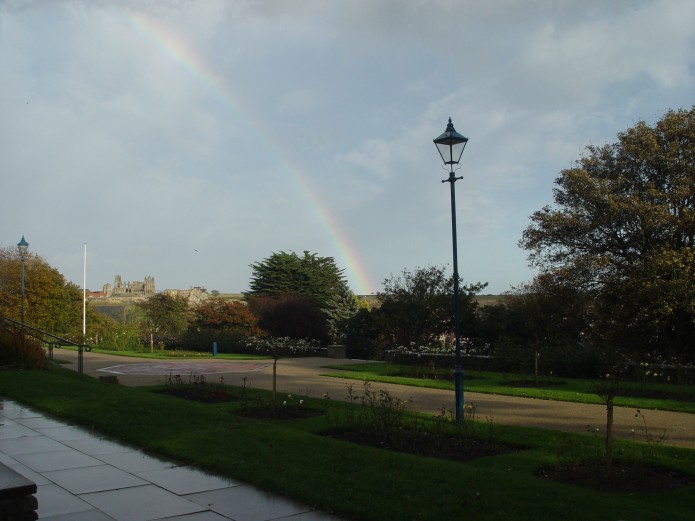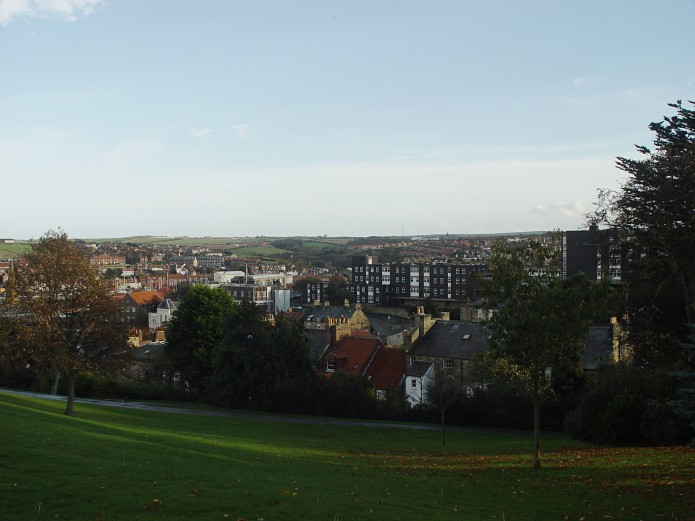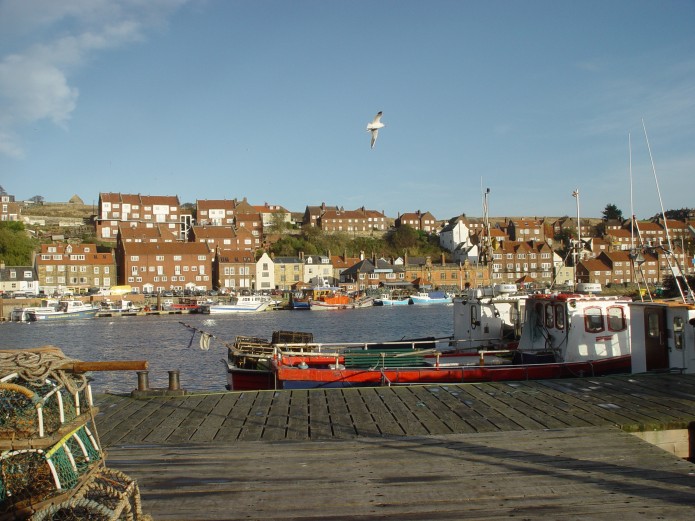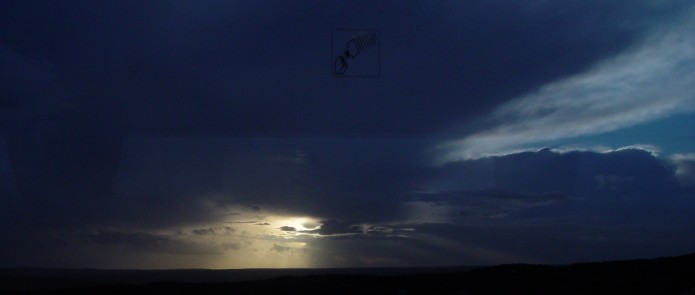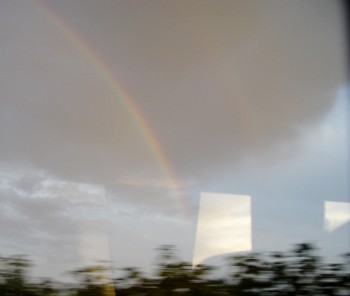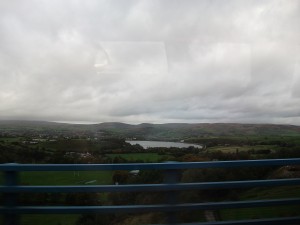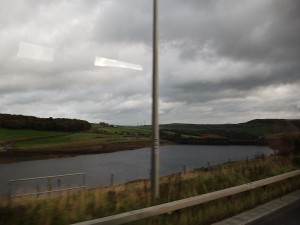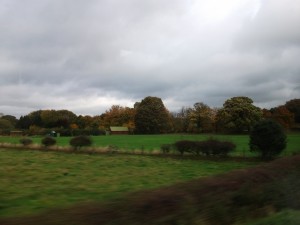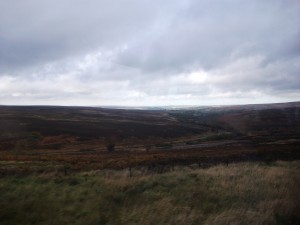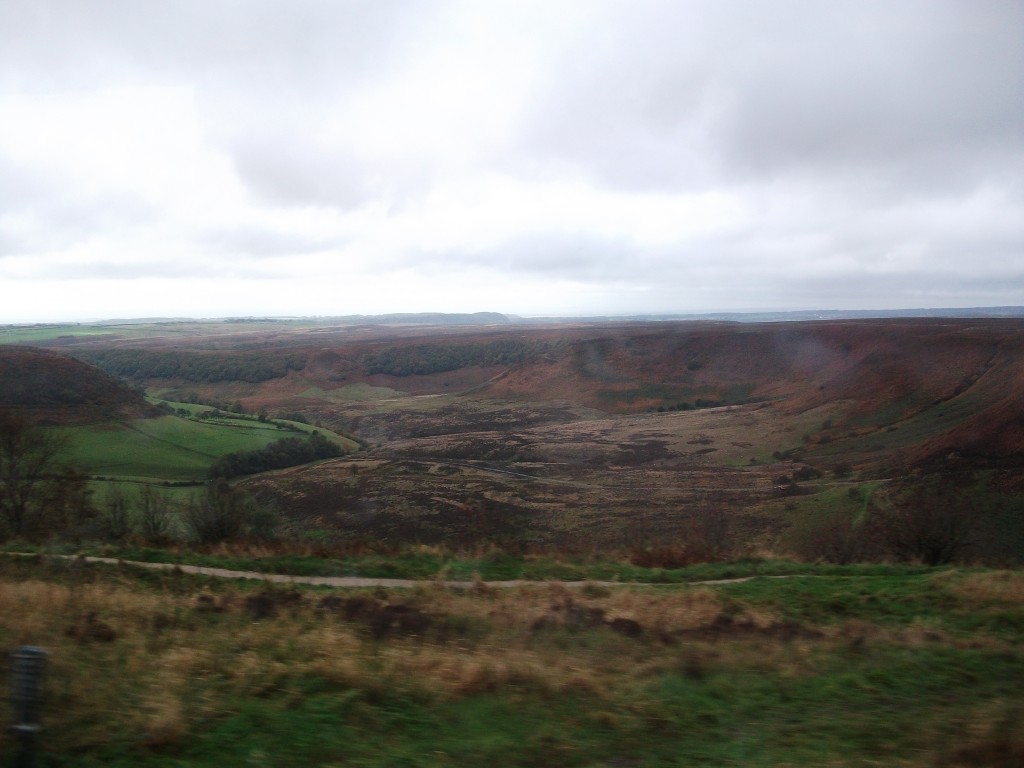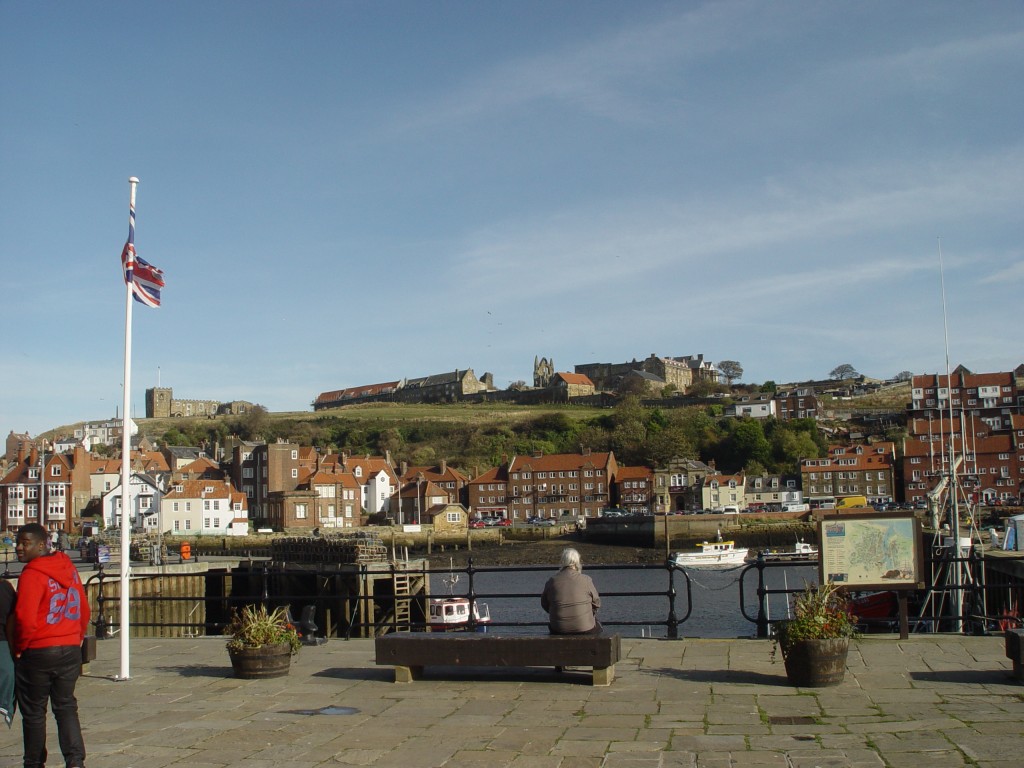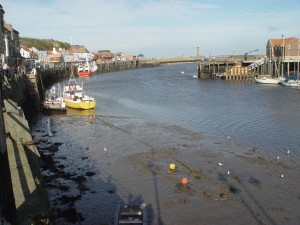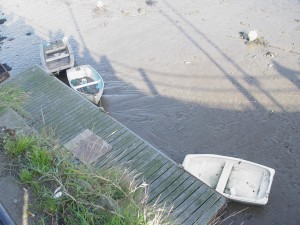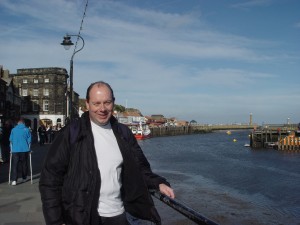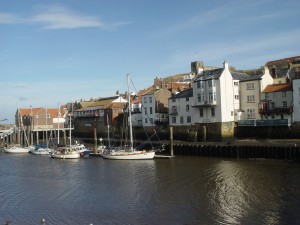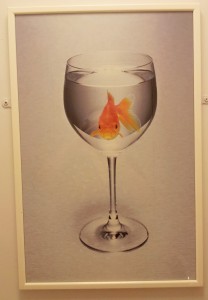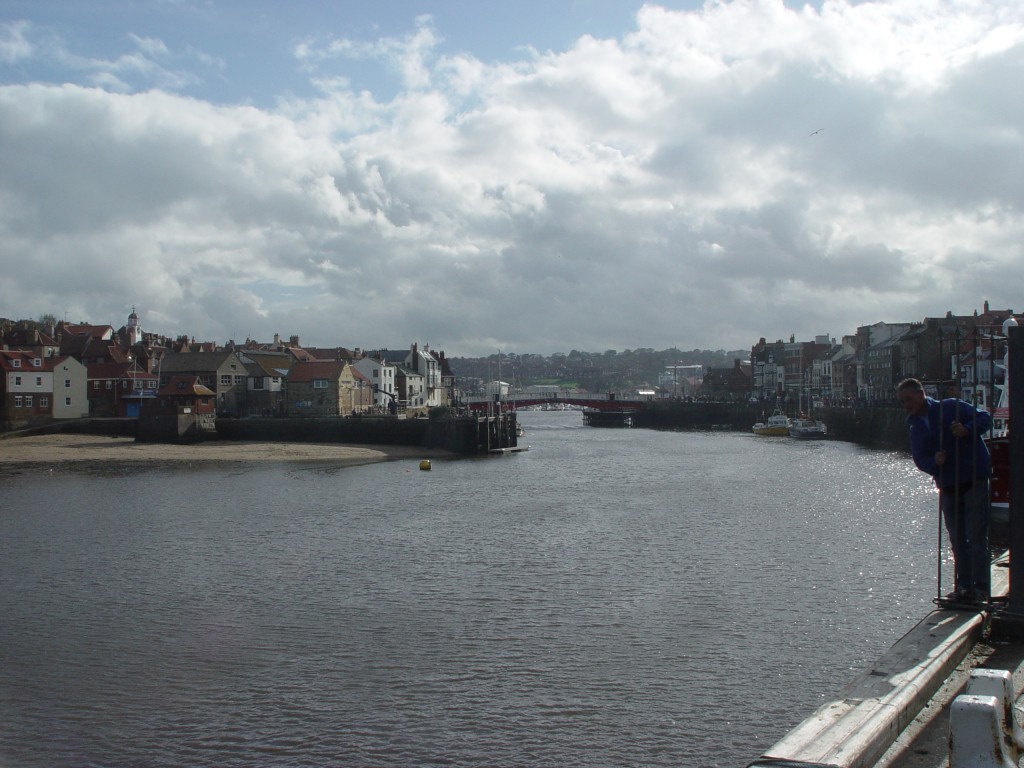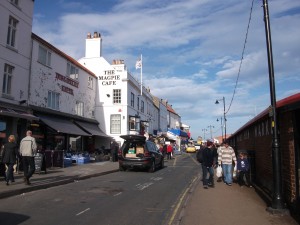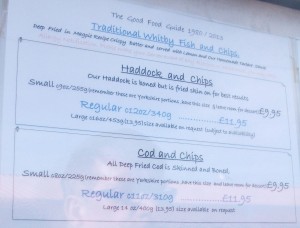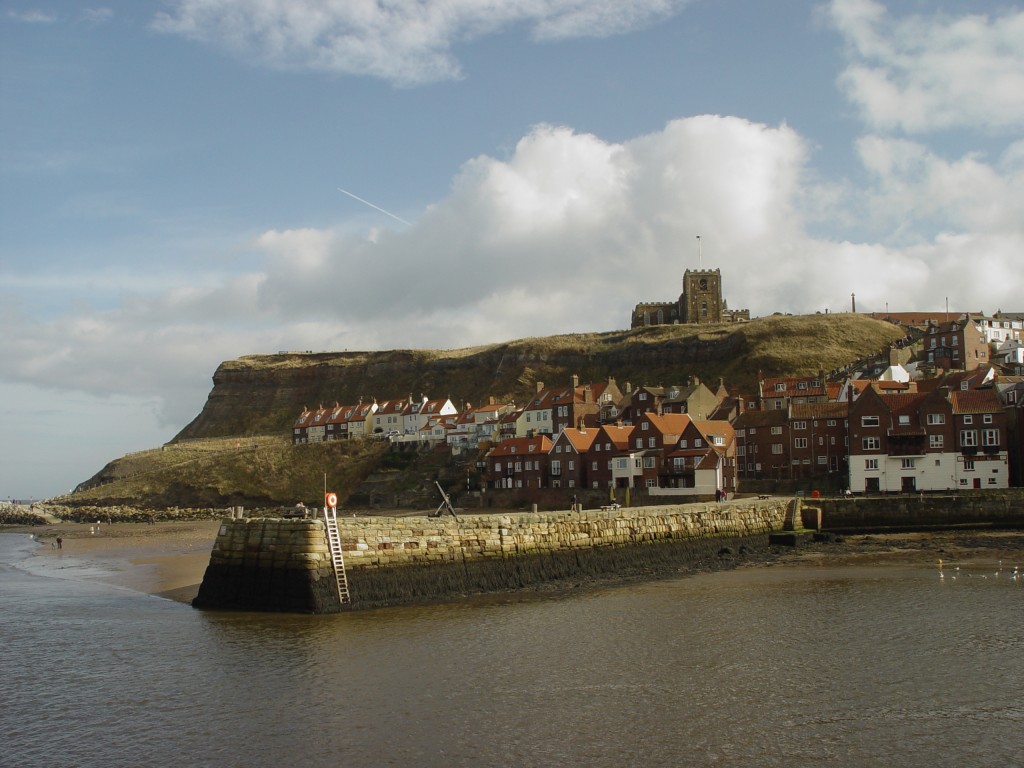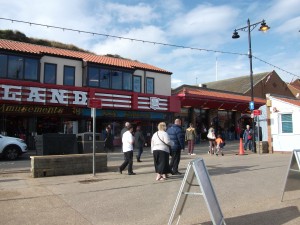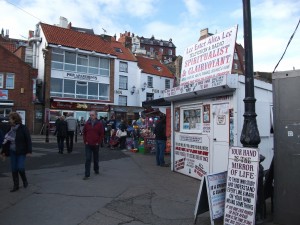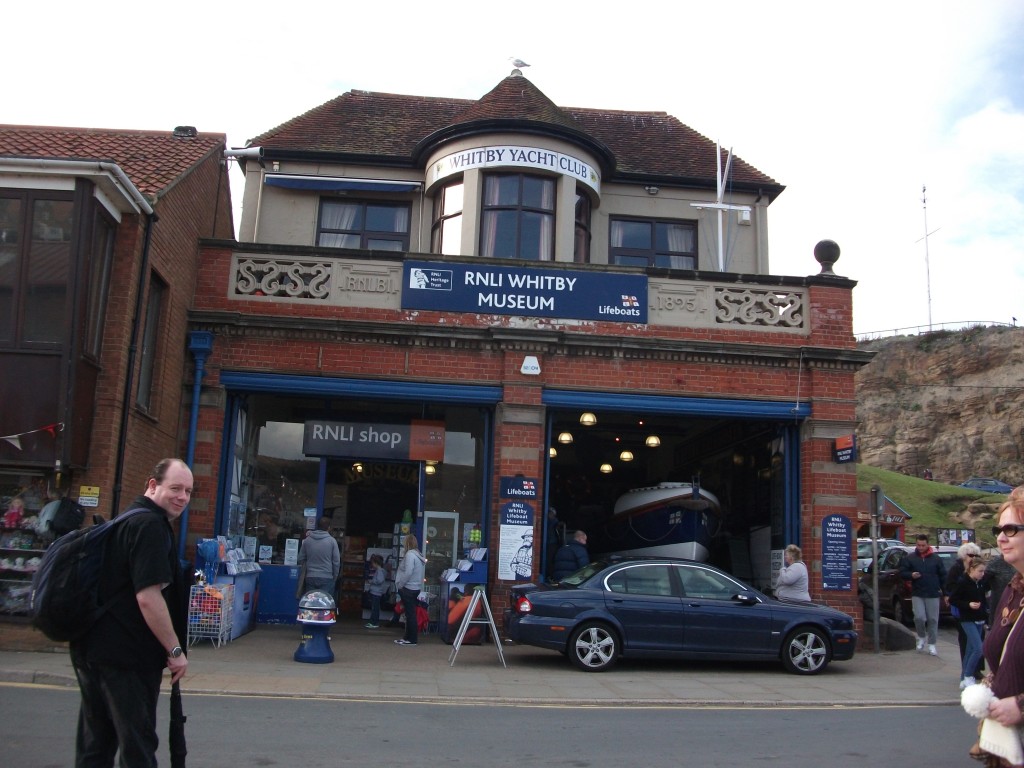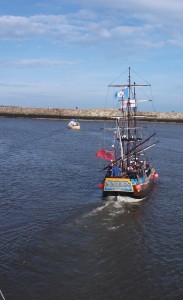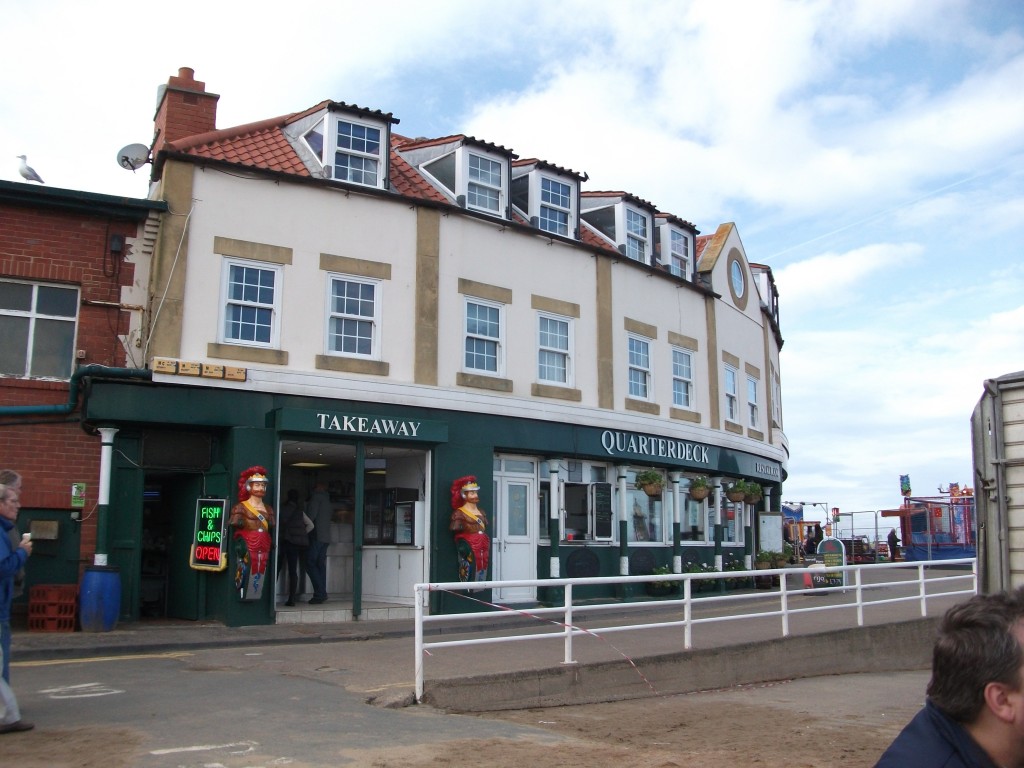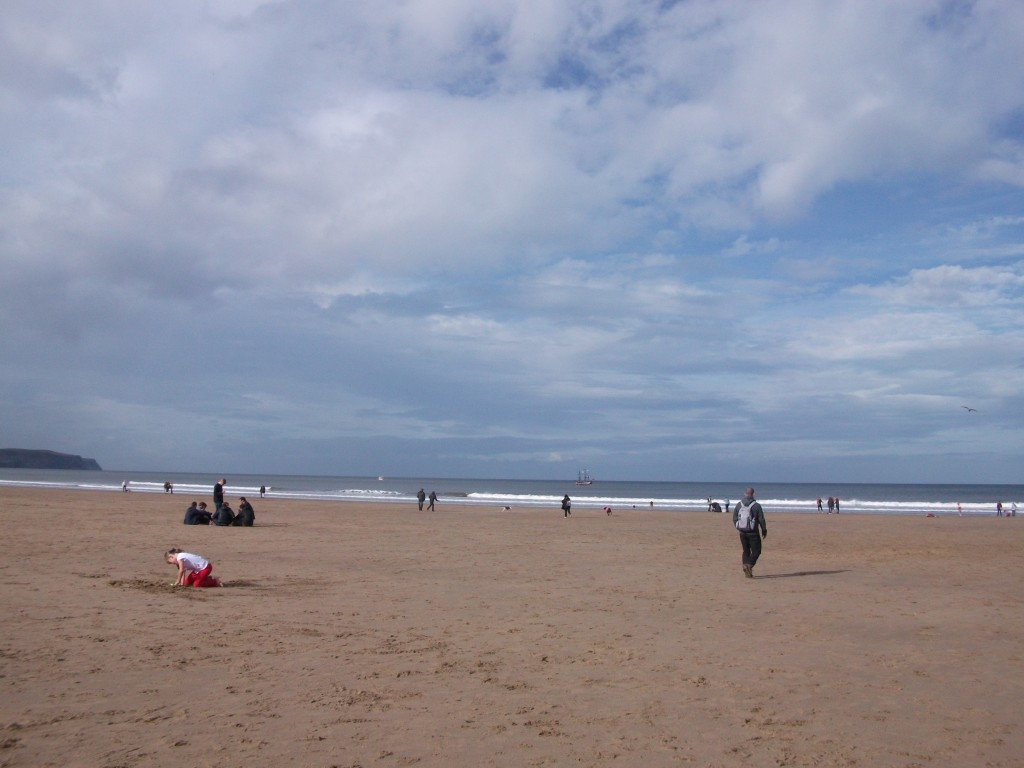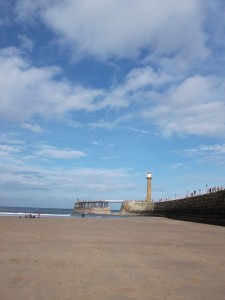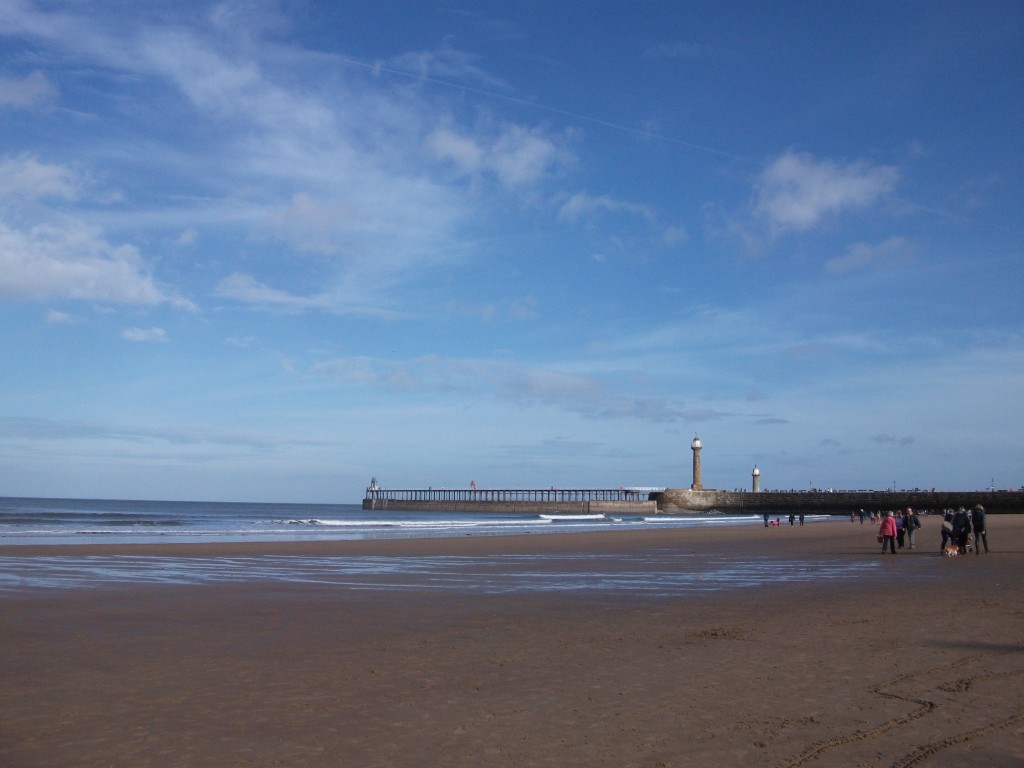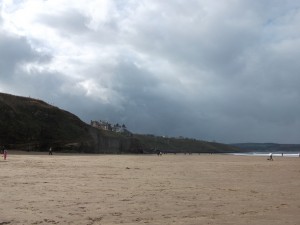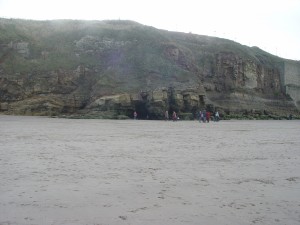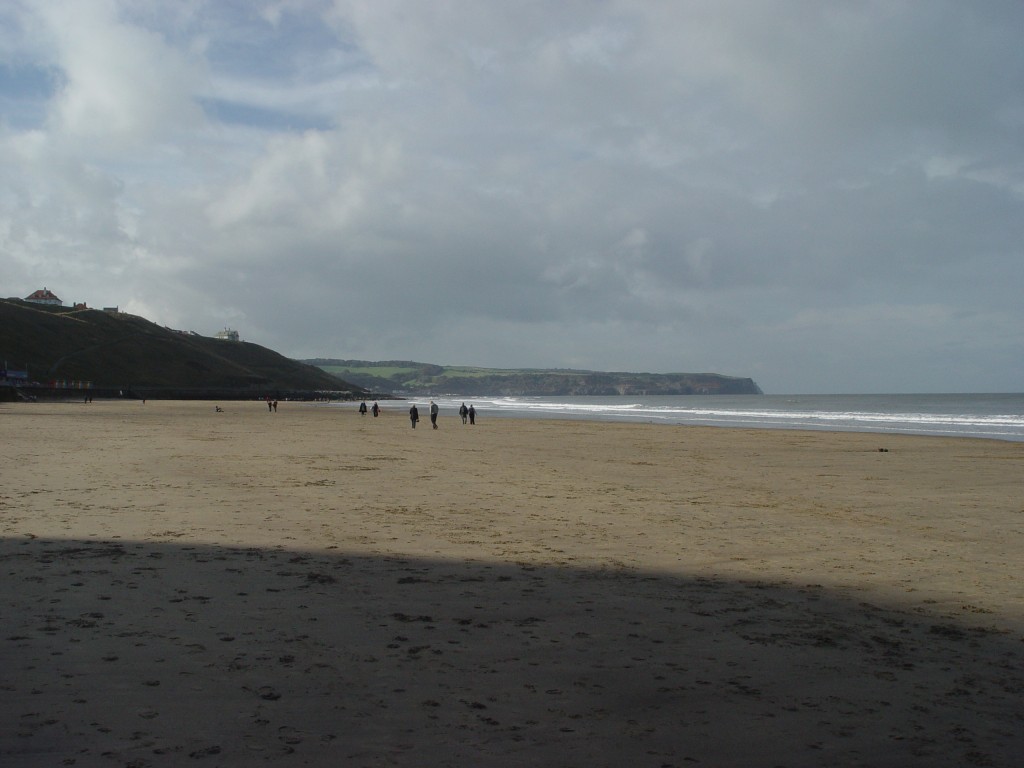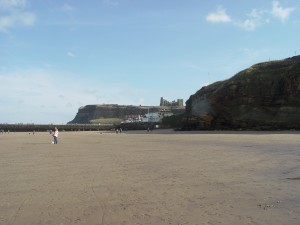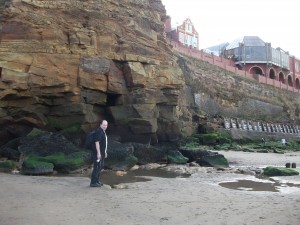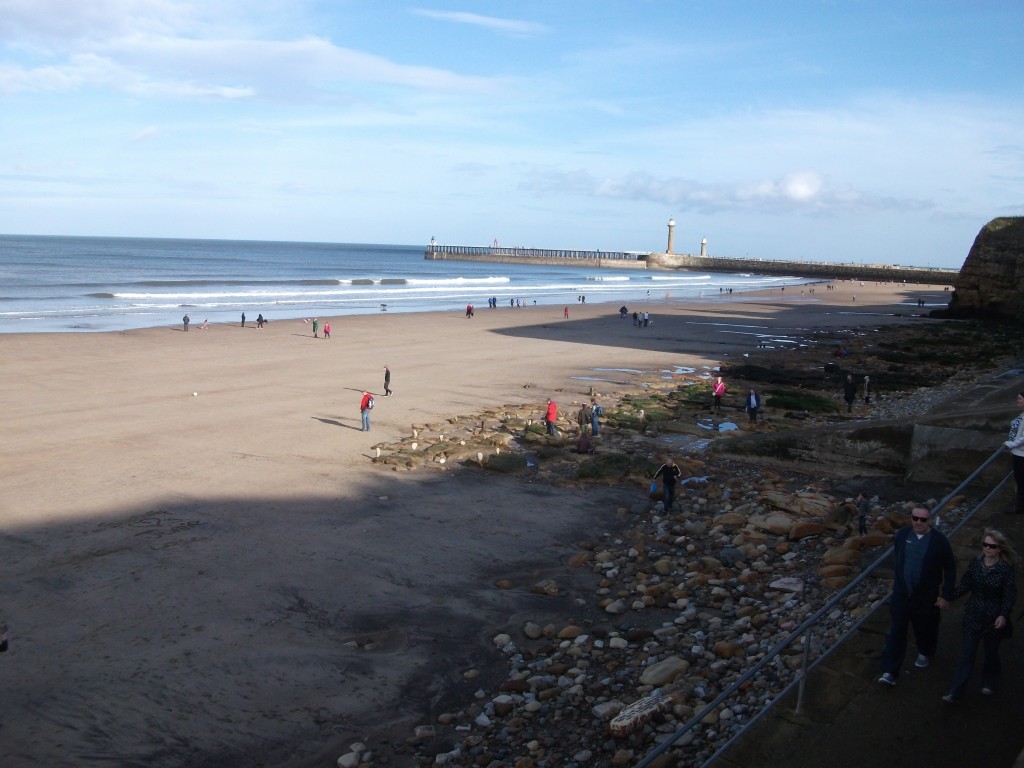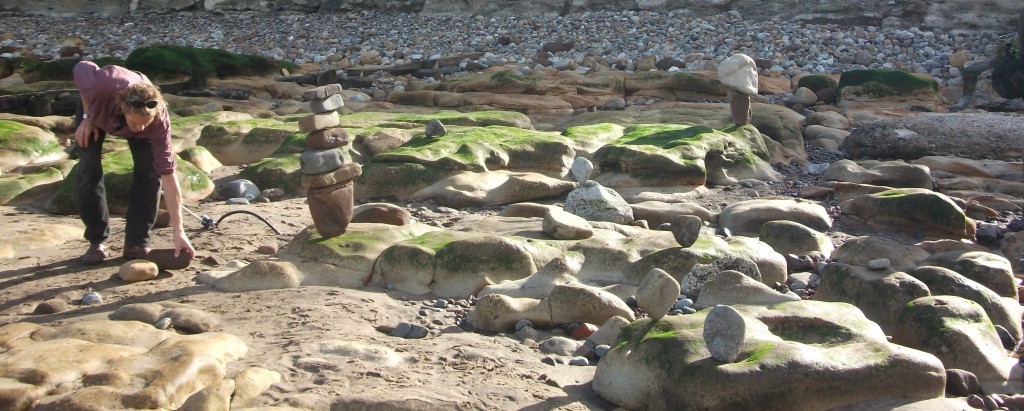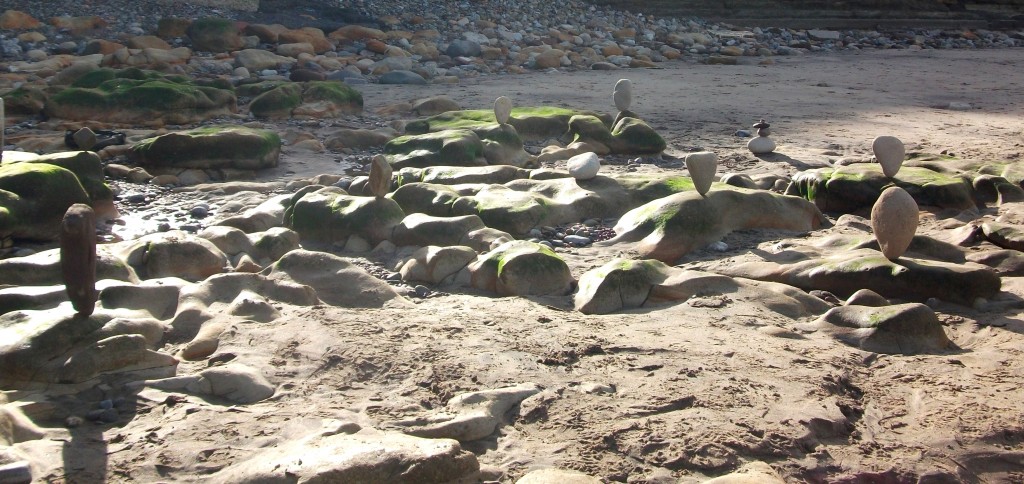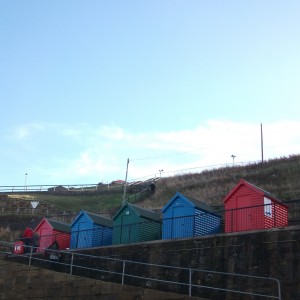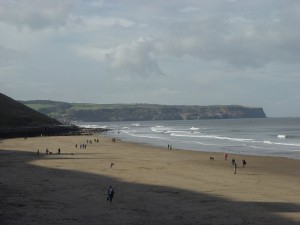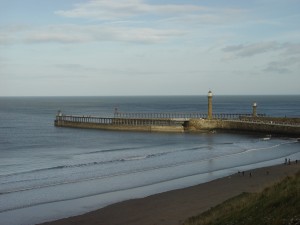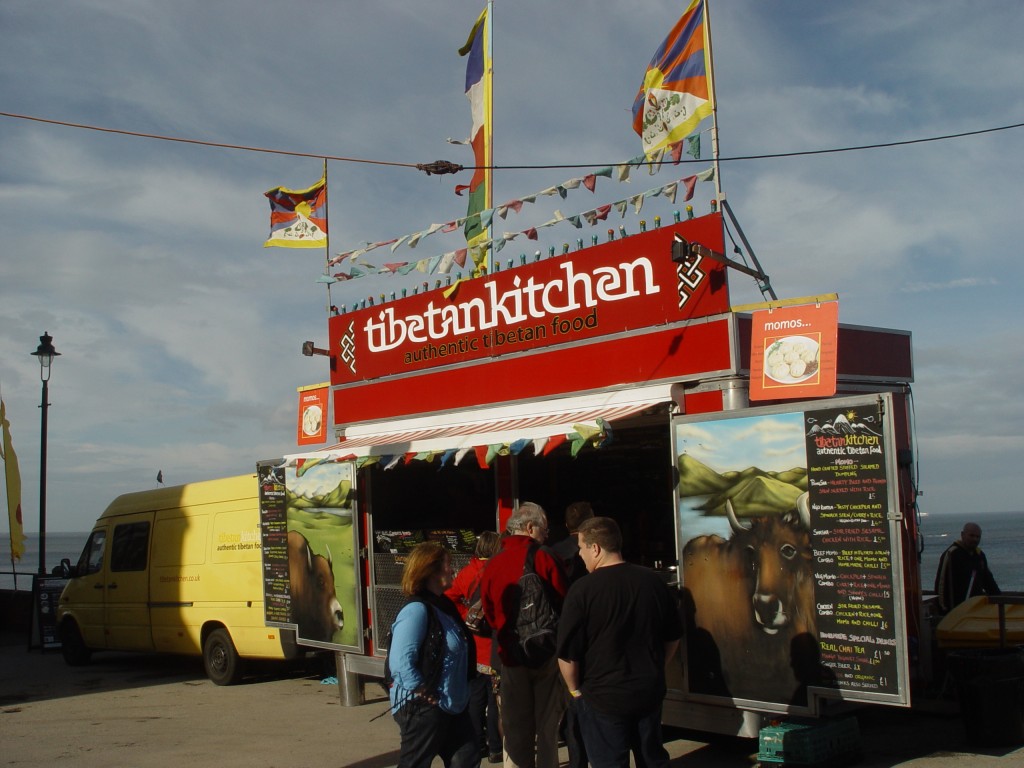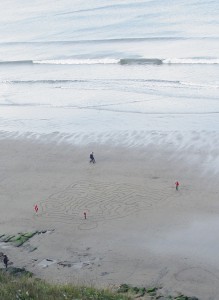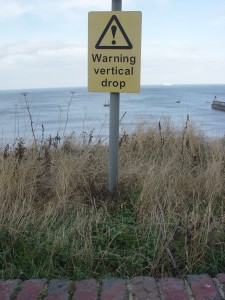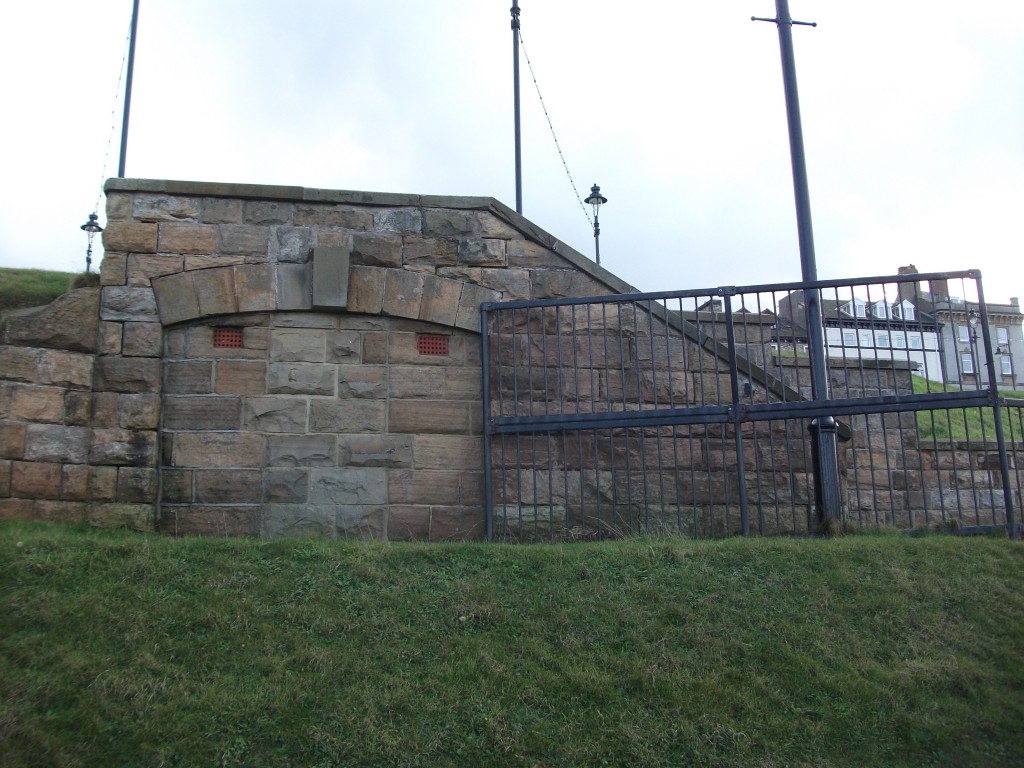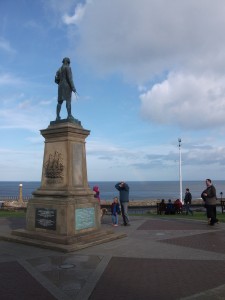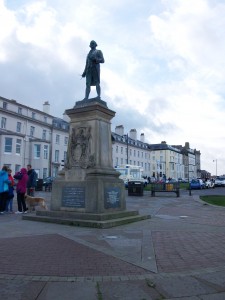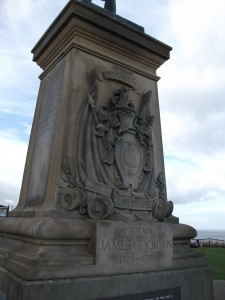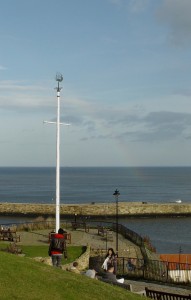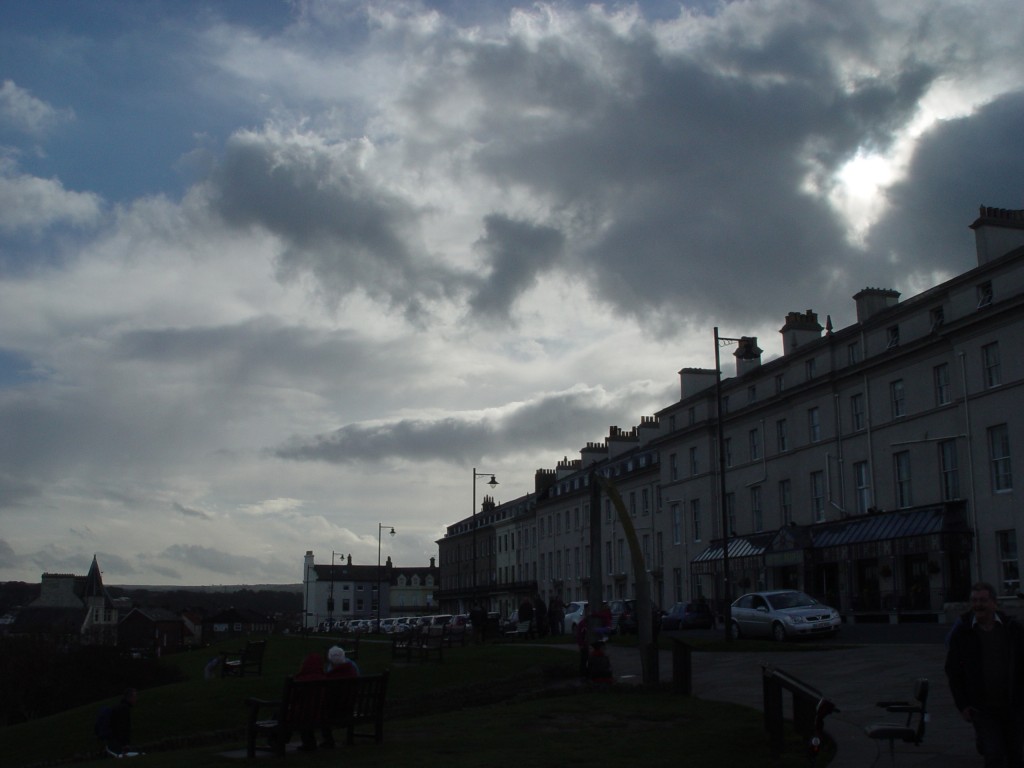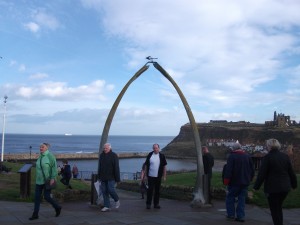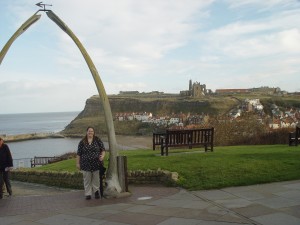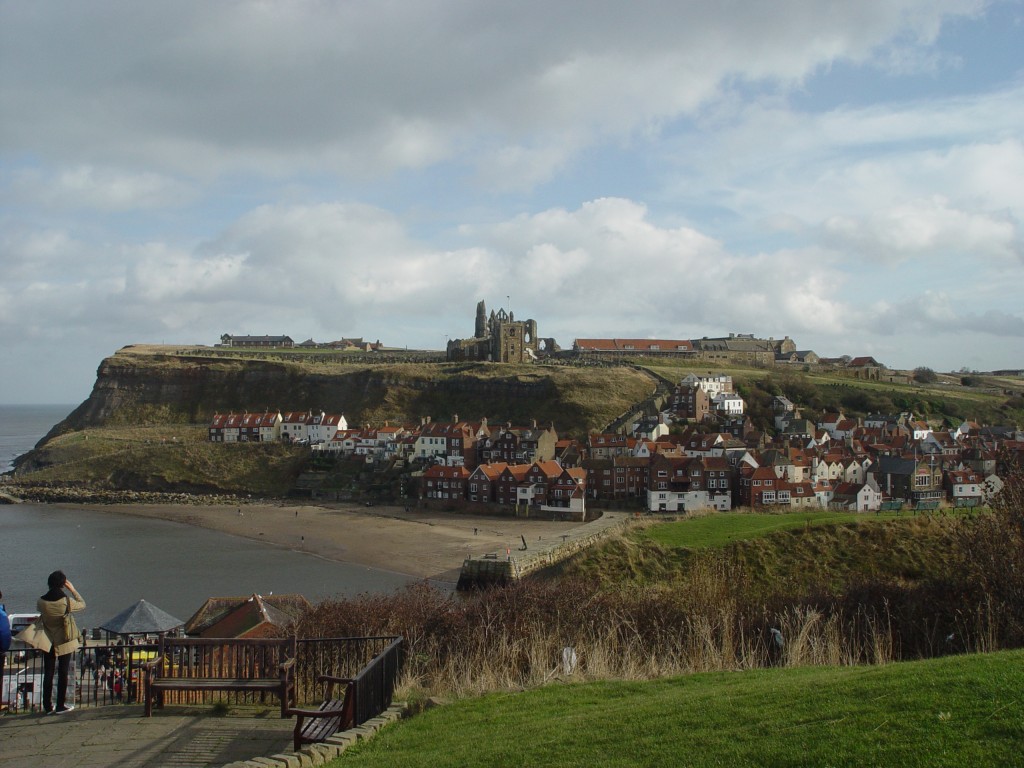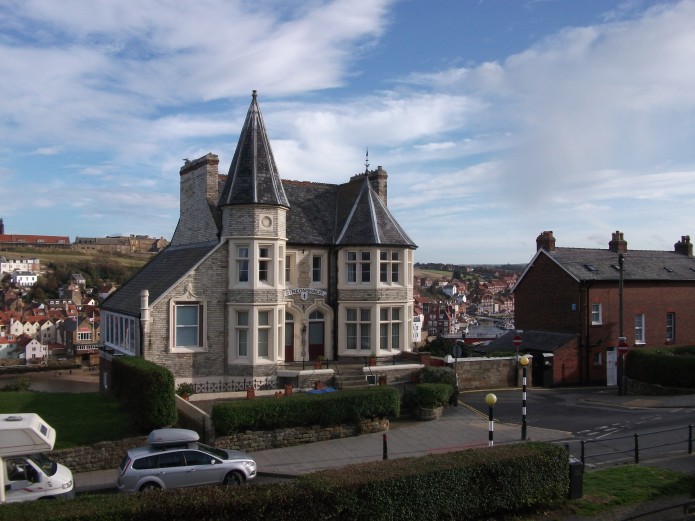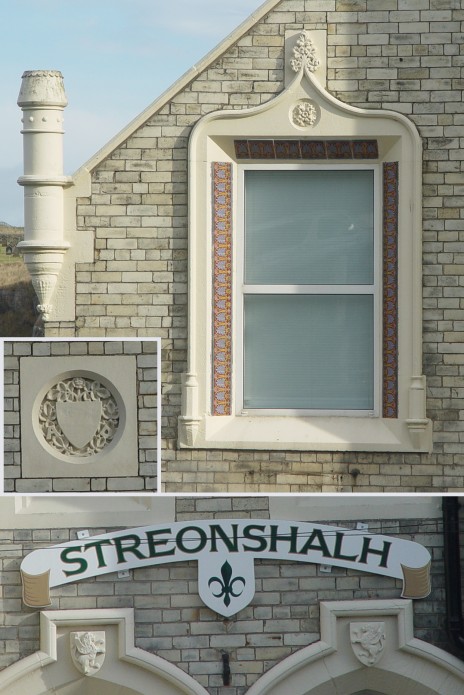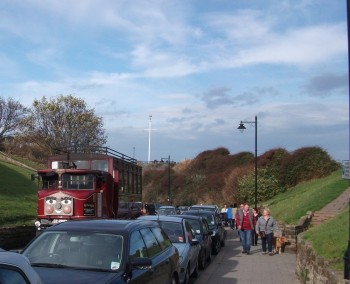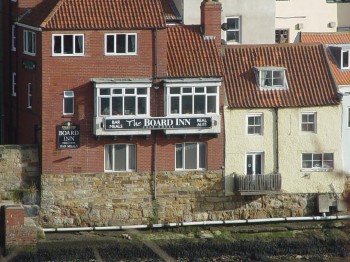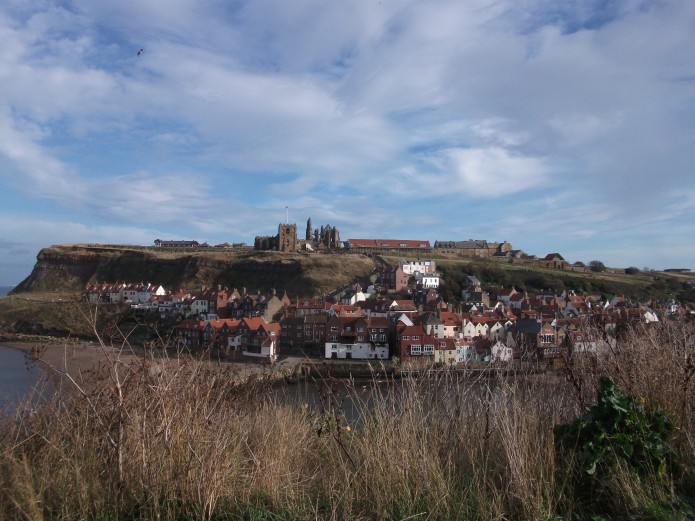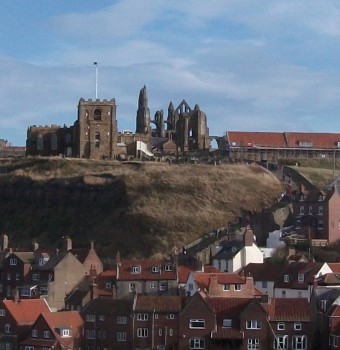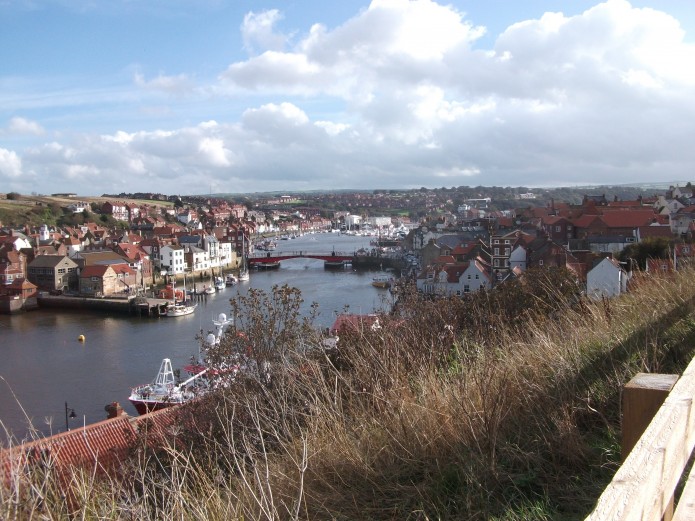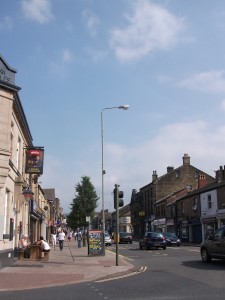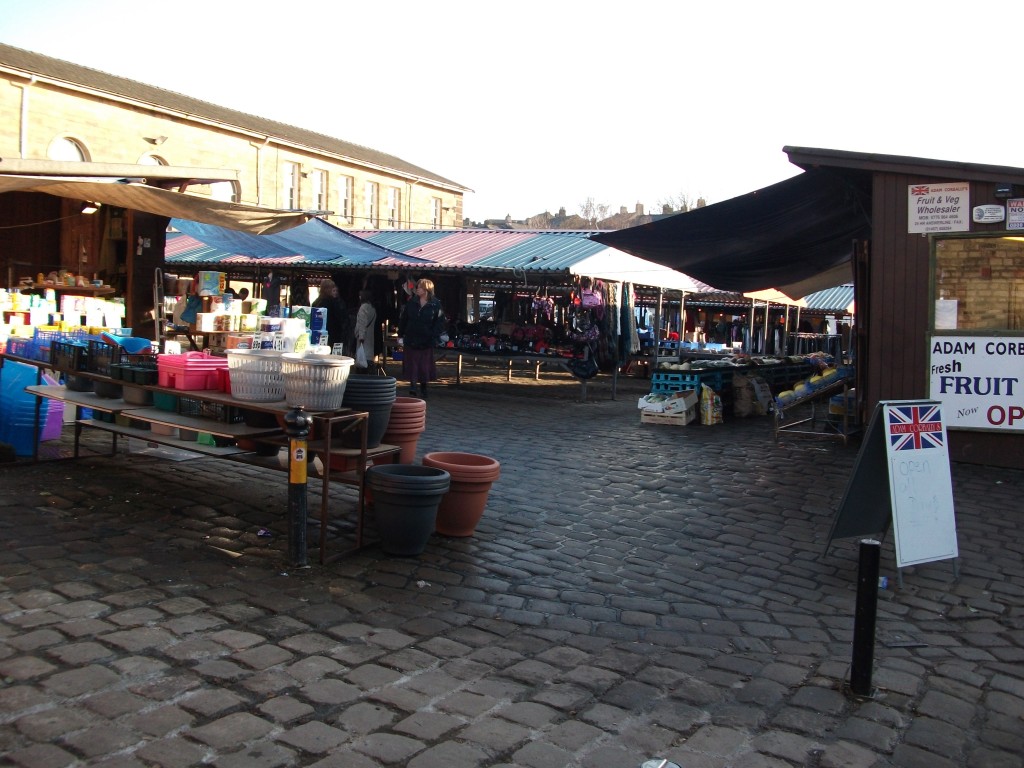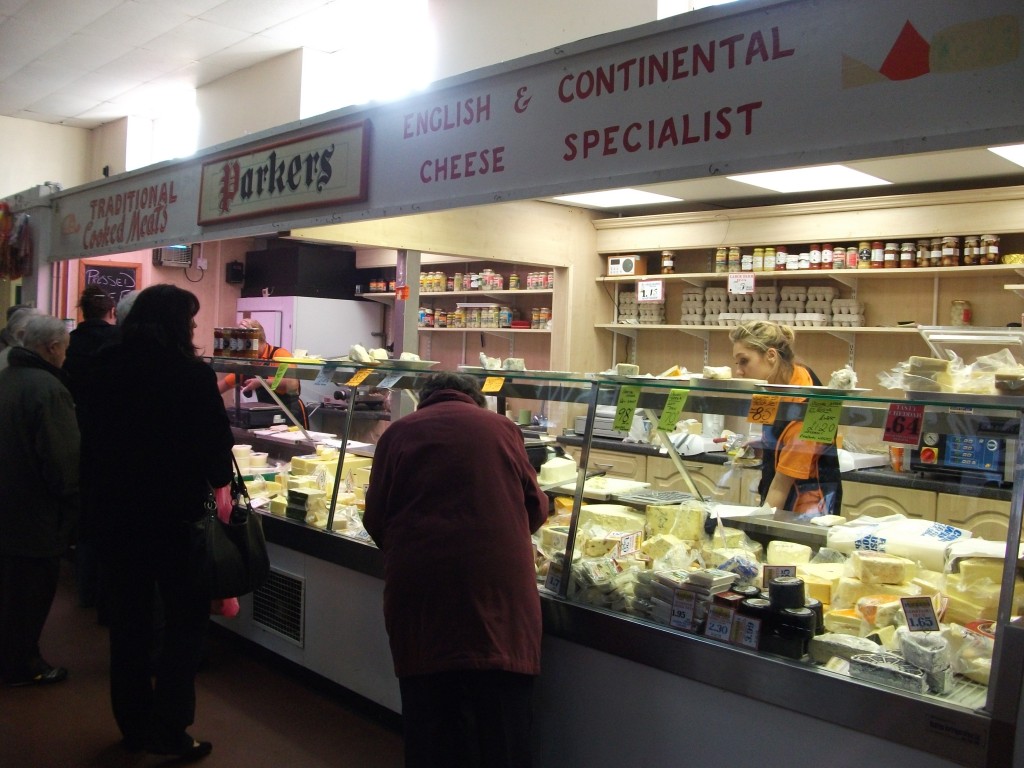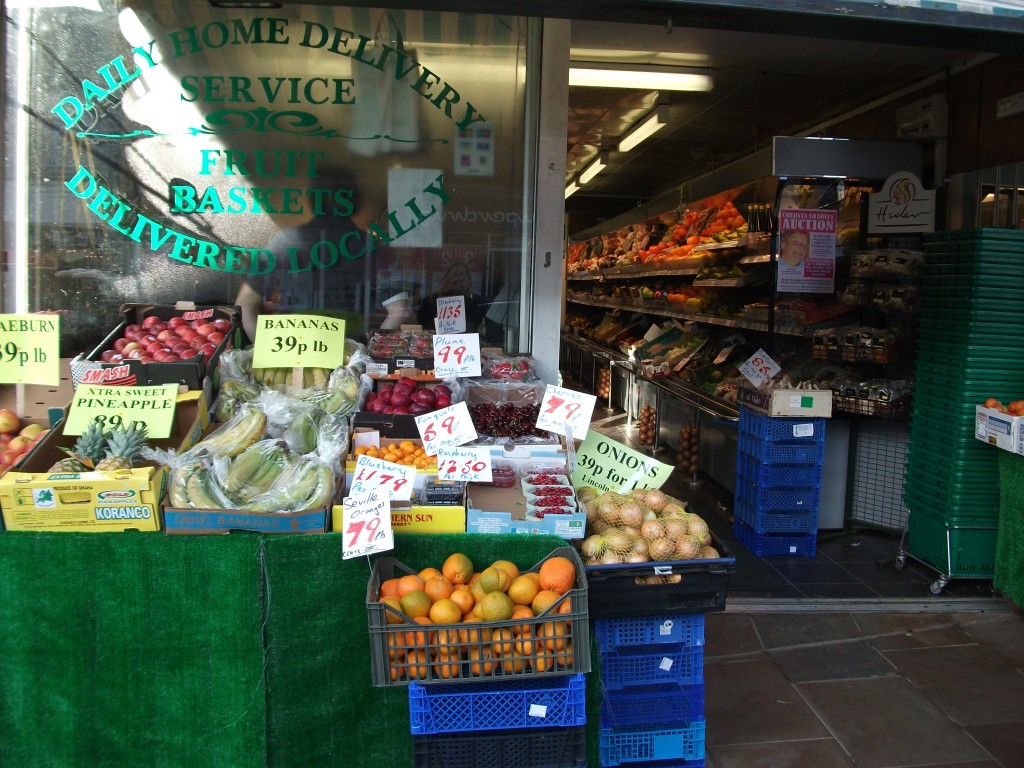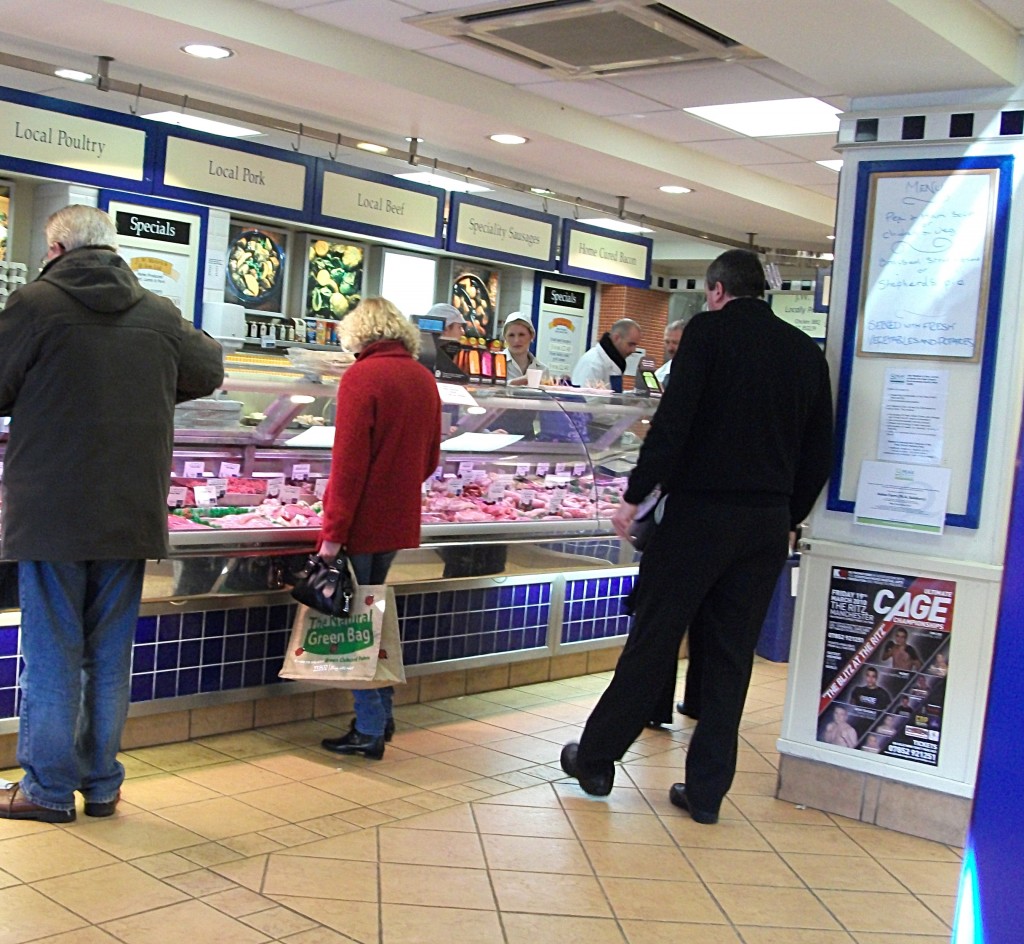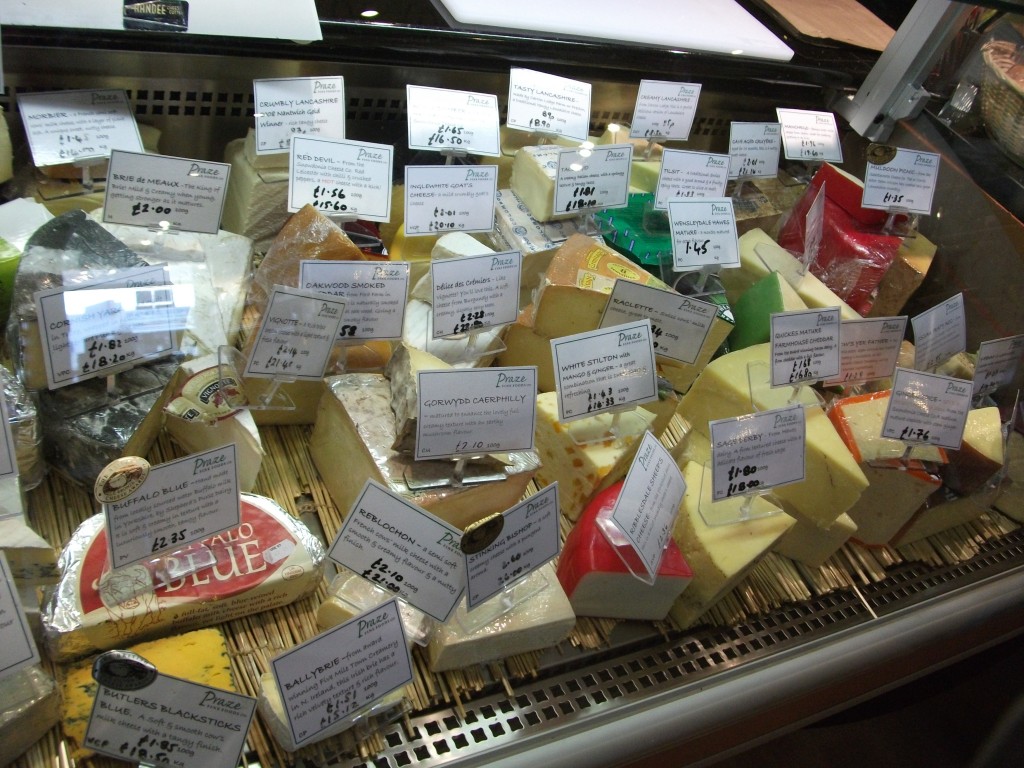Carrying on from the first installment, we’ll finish our wander through Whitby in this exciting second half! 😉
After admiring the coast for awhile, we decided to wander through the town a bit and see what there was to see.
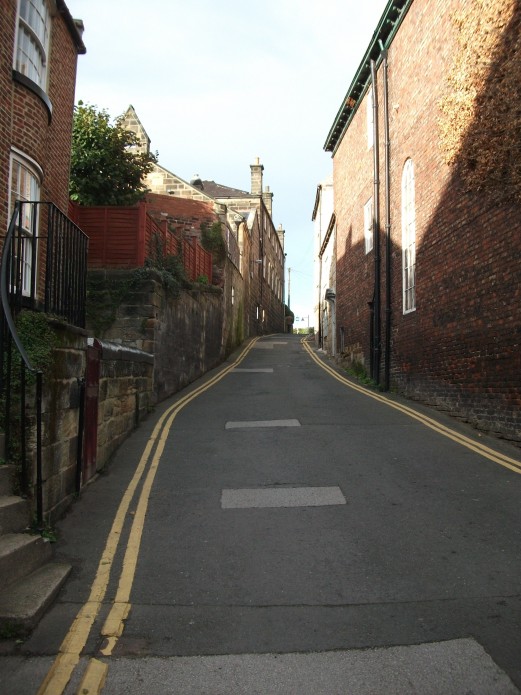 |
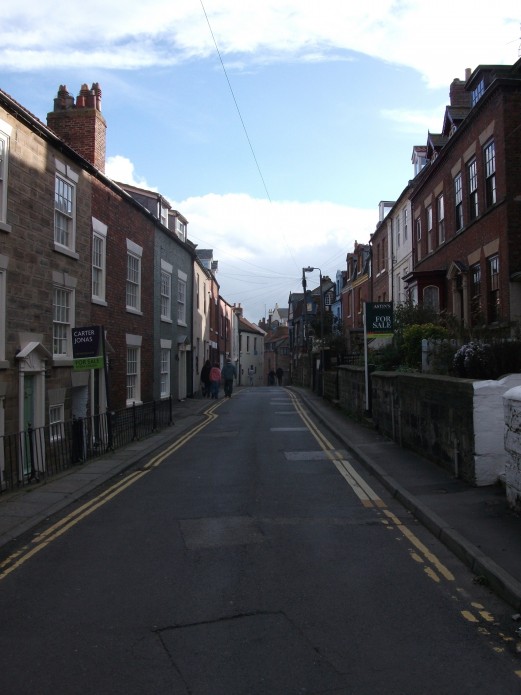 |
Some of the roads are very narrow. This was just wide enough for a car – and there were doors along that wall. Watch that first step! Thankfully, the super-narrow stretch didn’t last too long, and we had a bit of sidewalk then.
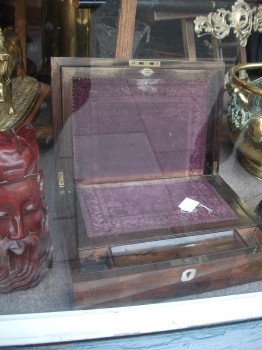 |
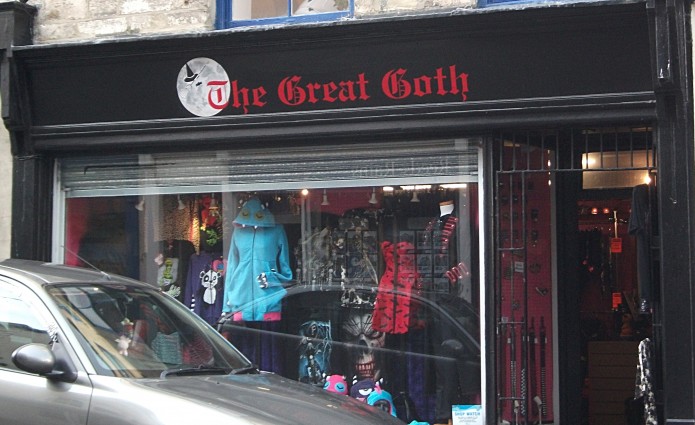 |
Any ideas what this thing on the left is? It was in an antique shop full of breakables, and we were laden with backpacks, so I dared not go in to ask. It’s wood, with purple velvet, a half-cylinder compartment about 6″ or so long, and then a smaller compartment next to it. With the ink staining that smaller compartment, Chris wondered if it was for writing – I can see storing ink in the small space and the pen next to it, but what’s up with the velvet surface? Anyone happen to know?
The Whitby Gothic Weekend happens twice a year – apparently Whitby was chosen because of its Dracula connections. I forgot to mention we passed The Dracula Experience earlier, down by the waterfront. Whitby is where Bram Stoker’s Dracula landed in England, after the ship ran aground there after a bad storm, and Whitby has, to an extent, capitalized on it – so it was a Goth-friendly place readymade for the Gothic Weekend. Chris was surprised this was the only Goth shop we saw, however – apparently the coverage in Fortean Times makes it sounds like the place is just crawling with Goth shops, etc. In fairness, we only explored part of the town, so perhaps there’s more we didn’t see.
I was so struck that this Poundland – an everything’s £1 shop – had these historic photographs/paintings on its window shutters. They’re all by Frank Meadow Sutcliffe (1853-1941), and these are from the Sutcliffe Gallery. Now that I look at it on the map, I realize we may have even passed that gallery later, when we were headed back to the bus. Huh. Might go inside to explore next time!
Also, we found an American-style diner! I glanced at the menu: it’s only cosmetically American, but hey, it was a bit novel nonetheless. 🙂
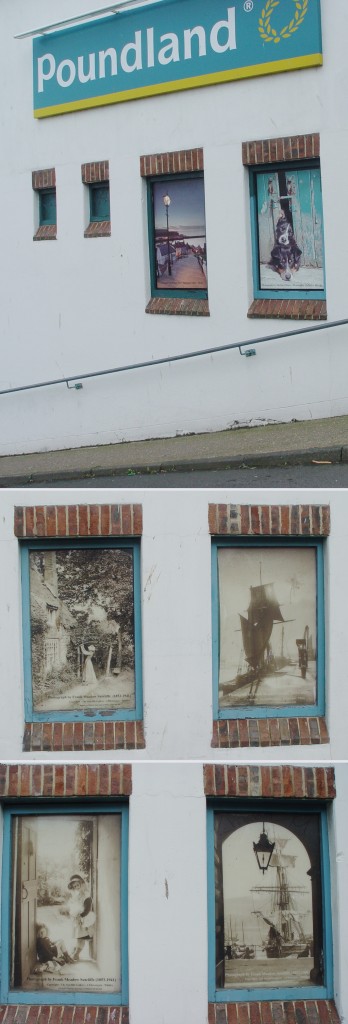 |
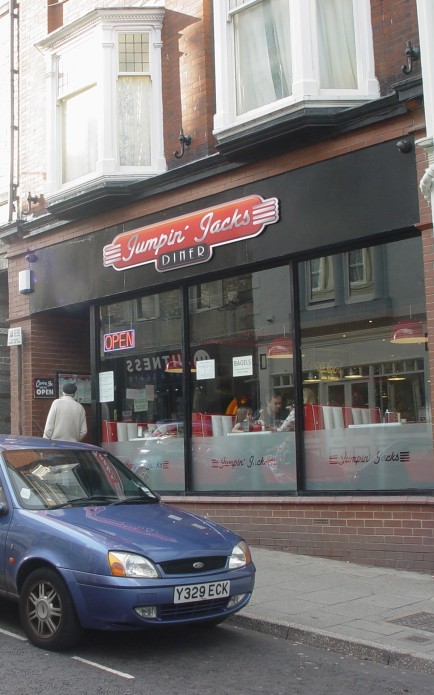 |
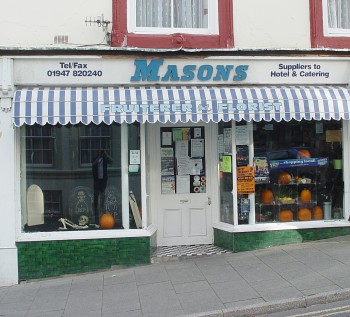 |
|
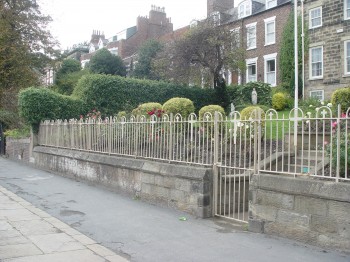 |
Halloween isn’t done as much here as it is in the US, so this window display was something to pause and look at – and then when I saw the sign above it, “Suppliers to Hotel & Catering”, I just cracked up. I had to get Chris to take a picture (all my batteries had died by this point) – you can see his ghostly self if you look carefully. 😉 Also, though no one local here seems to understand what gourds are when I use the word, the gourds in the right-hand window were actually labelled as such! Word choices are so very localized – even down to individual households, really.
The last photo is of the rose garden at St Hilda’s Catholic Church. It was lovely – you’ll need to click on it for the larger image to see it properly.
St John’s church is a Church of England church (Anglican) directly across the street from St Hilda’s. What struck us about this building, really, was the diminished soot covering the walls. It’s not clean enough to have actually been cleaned*, yet it’s not covered in pollution like the buildings I’m more used to seeing. Chris told me they didn’t do as much industry – mills, etc – up here in Whitby as they did down in our part. Not hard to believe – the air hanging thick with smog from the 40+ mills in my town was infamous. The Industrial Revolution, born in our county of Derbyshire, did have quite a lot of downsides – massive pollution was one of them.
* Either by sandblasting or the really cool-sounding method they used inside John Rylands Library. As I recall (I can’t find mention of it online anywhere), the tour guides told us they sprayed a special foam that clung to the stone, then peeled it off. The pollution came off, I expect with a bit of the stone. They pointed out the corners where they’d not been able to clean it properly, as contrast. The corners were black; the sandstone is a dazzling array of light colors. When they did it, they got an entirely different building when they finished.
We were vastly amused at the Black Hole Ahead sign – glad they warned us! We didn’t find it, alas.
We found ourselves at the entrance to Pannett Park, so we wandered inside to see what there was to see. The first thing we found was the Lily Pond, which was quite tranquil – at least, until other people showed up!
We wandered along, and spotted the hugest monkey puzzle tree I’ve ever seen!
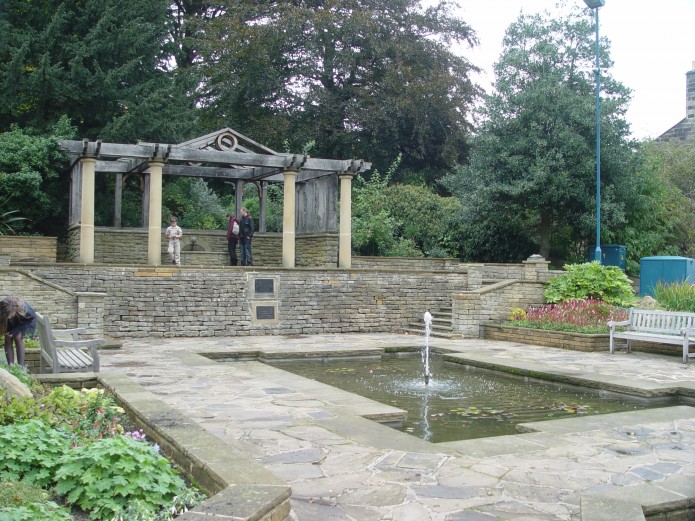 |
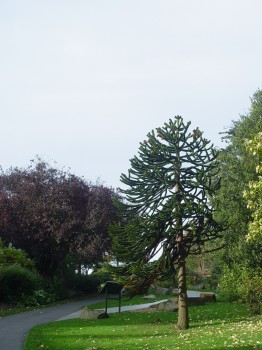 |
It was at the entrance to the Jurassic Garden, which is, as the sign told us:
A pathway through the past
The path you’re on takes you through the Jurassic period. Each band represents a rock layer from the Yorkshire coast – the colors of the rocks and the length of each band is in proportion to the depth of the rock. The first rock, where you are standing, is the Redcar Formation and is the oldest, laid down about 195 million years ago. As you walk along the path you will travel through 60 million years of Jurassic time!
In each band of rock you will find casts of fossils, including ammonites, corals, and dinosaur footprints. These impressions are taken from actual fossiles in the Whitby Museum collection. … Alongside the path there are plants from the Jurassic period, including tree ferns, gingkos, and a monkey puzzle tree.
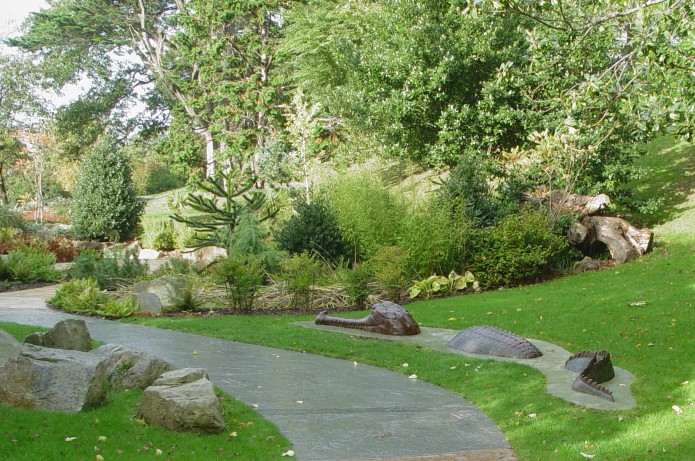 |
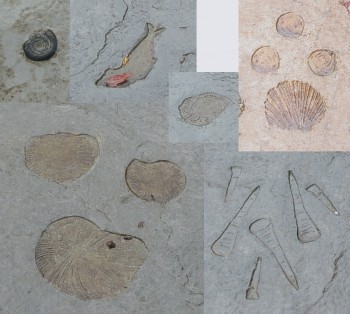 |
I liked the crocodile best, myself.
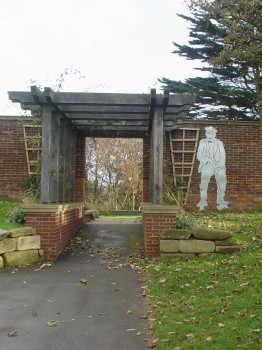 |
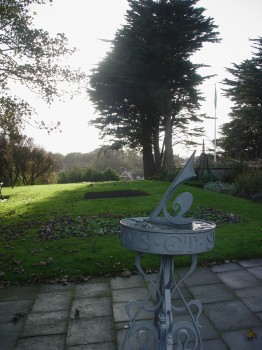 |
The garden at the top of the park – surrounding Whitby Museum and Art Gallery – was guarded by two gardeners – one here, and one on the other side of the garden. Thankfully, they let us pass – in and out again! We reckoned the sundial might work a tad better if it weren’t in the shade.
I was a bit confused about these rectangles patches for planting flowers, just in the middle of the grass. You can see one planted in the middle background behind the sundial, and one unplanted one in the far background.
Our second rainbow of the day! Ironically for living in such a damp land, I see rainbows very rarely. I usually feel the presence of Papa, my grandfather, when I see one. I do hope he enjoyed touring around Whitby with us that day. 🙂 We took time to smell the roses in this garden, while enjoying the rainbow.
The Play Area was neat! I never had anything that nice when I was a kid!
Just past the play area, another view of Whitby. I’ll bet loads of local residents want to shoot whoever allowed Whitby Hospital to take such a hideous shape (it’s that black and white monstrosity in the centre of the frame). In terms of styles, the 1970s have a lot to answer for! Hopefully the contents are better than the package.
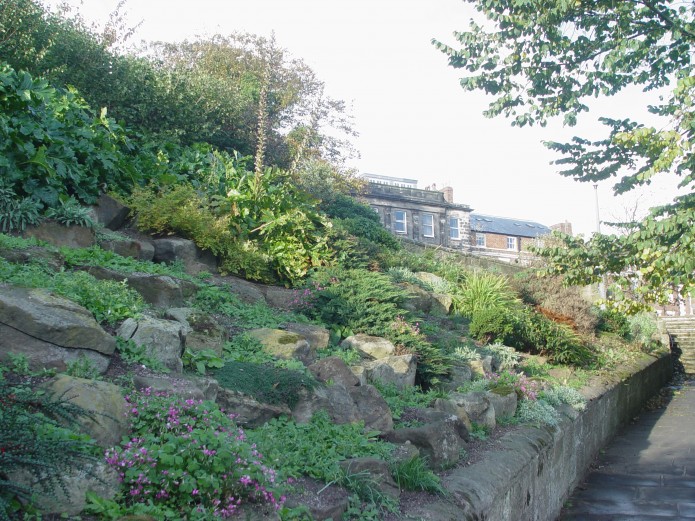 |
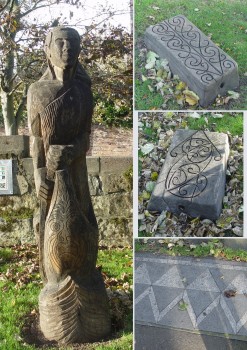 |
Our last stop was the South Seas Garden, which is filled with Maori art (the Maori are the indigenous Polynesian people of New Zealand). The sign next to the figure is informative, if you’re curious.
This chunk of the park is right up against the perimeter, so from bird’s eye view, you’d see an eye-shaped path, with the sidewalk around the outside of the park forming one part, and the sidewalk through this chunk forming the other part. While we were there, this man and little boy passed by – the man stayed on the outside sidewalk, but the very focused and determined little boy (about 4 years old, I’d guess – he was walking quite well without assistance) picked up a heap of fallen leaves just outside the garden, then carried them through the garden, then met back up with the man (father? uncle? friend of the family? never know) at the other end of the little garden, having tossed his leaves into the air just as soon as he got out of the garden and back onto the main sidewalk. Kids. *shrug*
Once we’d seen all of Pannett Park, we decided we should wander back towards the bus.
A few things caught my eye, like this intricate painting on the side of a bookshop, juxtaposed with the street name sign next to it. Also, I know the pub is named after one of Captain Cook’s ships, but it still strikes me as a treasure trove of puns to name the pub The Resolution.
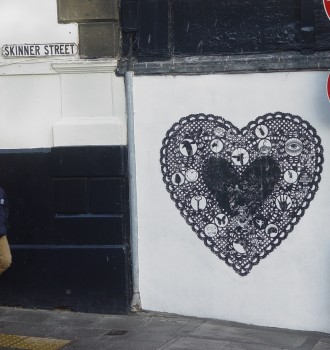 |
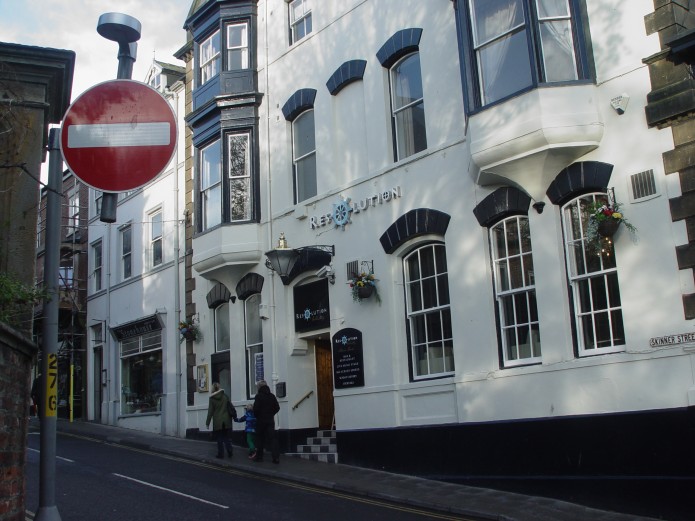 |
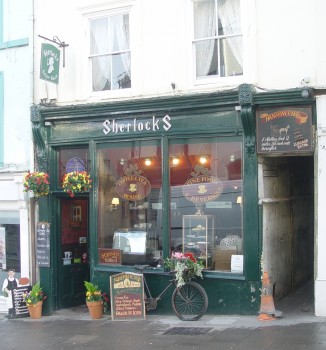 |
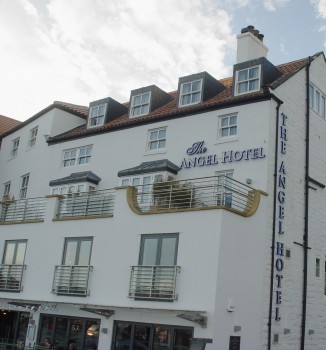 |
The Sherlocks shopfront looked interesting – I should’ve gone in and had a look around, really. I did wonder if someone made a typo originally on the Angel Hotel (Angler) and they’ve just rolled with it since.
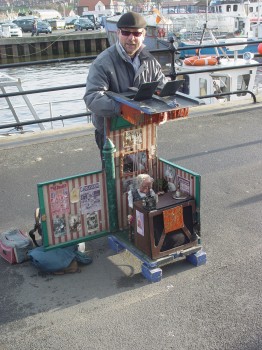 |
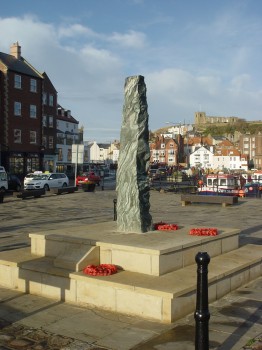 |
This busker‘s set up was delightful – and the music wasn’t bad, either, so I stayed and enjoyed a song.
This stone is Whitby’s war memorial. I’m used to cenotaphs (which I now see come in all different shapes), so this was a bit of a surprise. The cenotaphs I’m used to seeing have the names of the locals who were killed in war engraved onto plaques attached to them. The sign informs us that there used to be a War Memorial Hospital in Whitby, but it’s gone, and besides, they’d realized not all the names that should have been listed were. So they decided to create this memorial instead: a double plinth of locally quarried sandstone at the bottom, and a piece of Masi Quartizite from the far north of Norway, where the Green Howards (the Yorkshire Regiment) saw action in 1940, and lost many men. They don’t plan to engrave names this time; they’re leaving a simple “Lest we Forget” engraved in the sandstone.
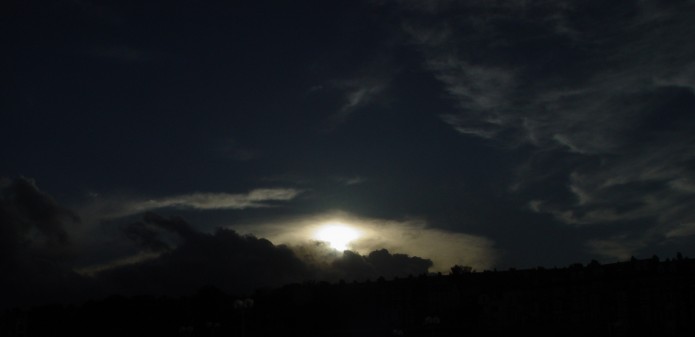 |
|
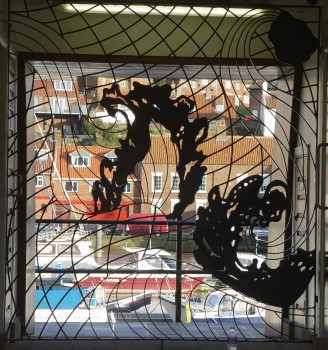 |
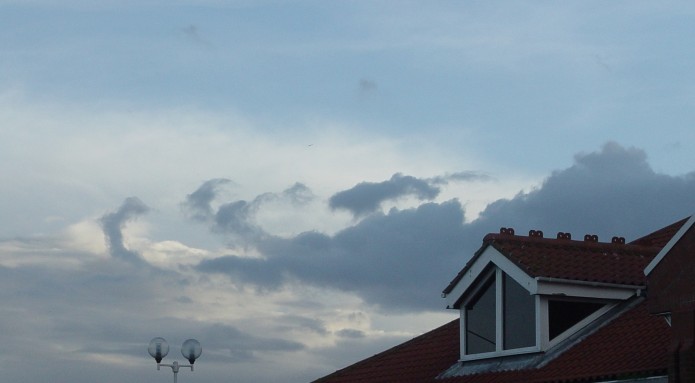 |
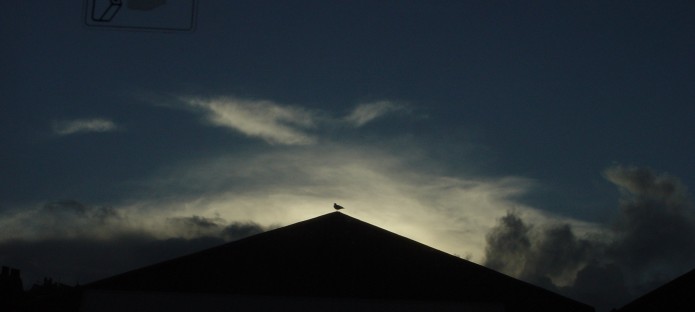 |
|
The sky was very moody. Also, the gates outside the public toilets were oddly arty.
It was nearly 5pm, so we prepared for the long ride home by hitting the loo and grabbing a coke for me. Then the bus turned up, so off we went.
On the road from Whitby to Pickering, we passed Royal Air Force base Fylingdales, a listening station – a relic of the cold war, the driver told us.
We also saw this very strange cloud.
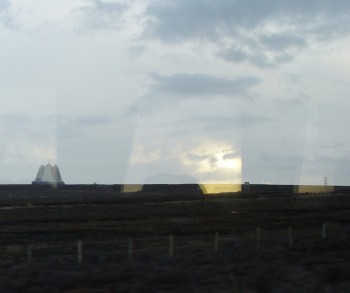 |
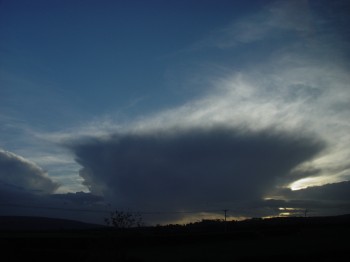 |
Then Papa said goodbye with a full double rainbow – we weren’t far enough away for it to show up all at once on camera, but at least coaches have great big huge picture windows, so we saw it all perfectly (helped that it was on our side).
I was absolutely shattered – too little sleep the night before, followed by a long day – so I promptly fell asleep then, for about an hour. Then Chris and I chattered away the miles until we got home, a bit after 9pm. A very late dinner was immediately followed by bedtime!

